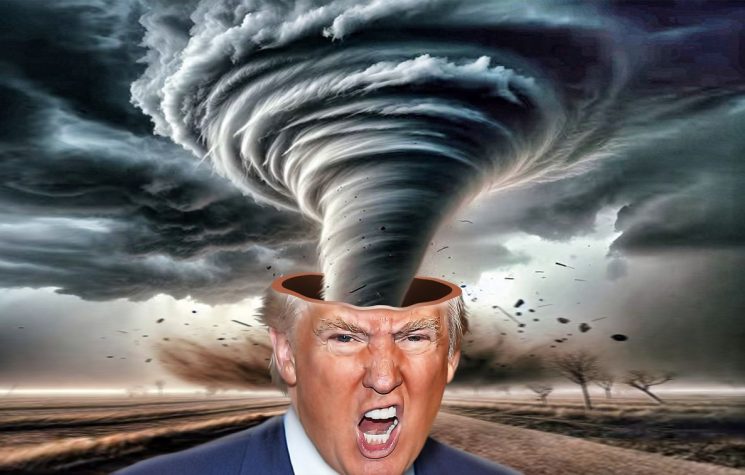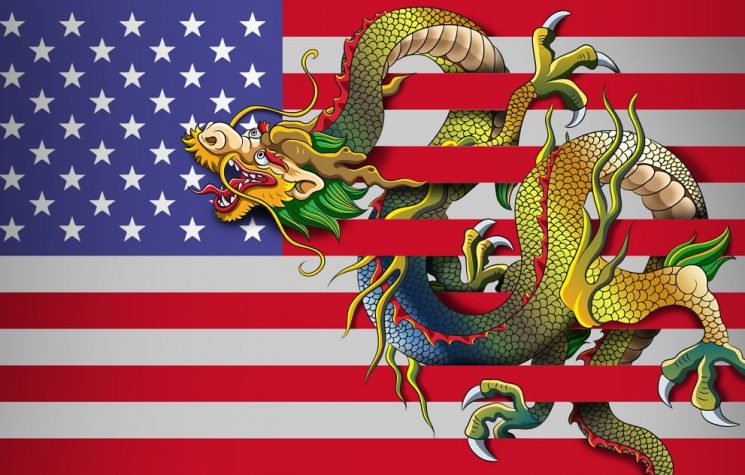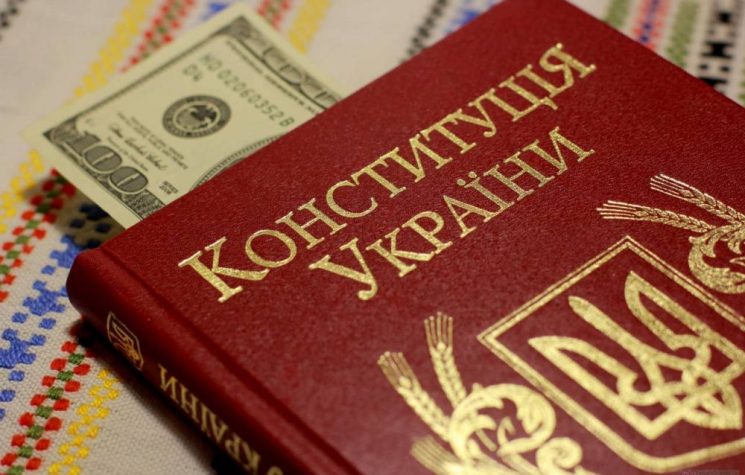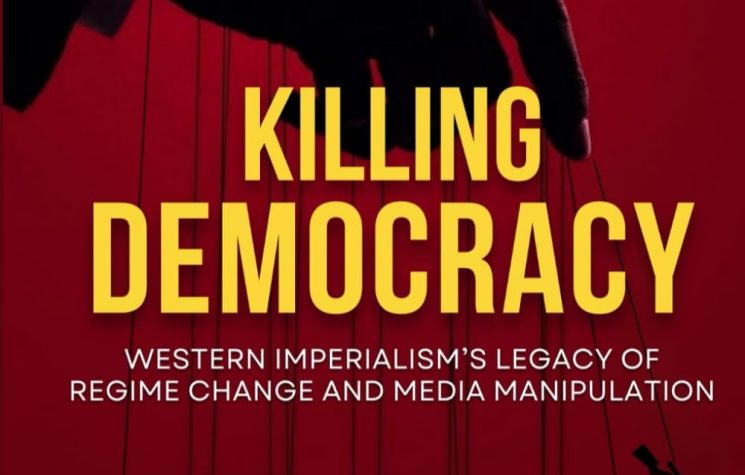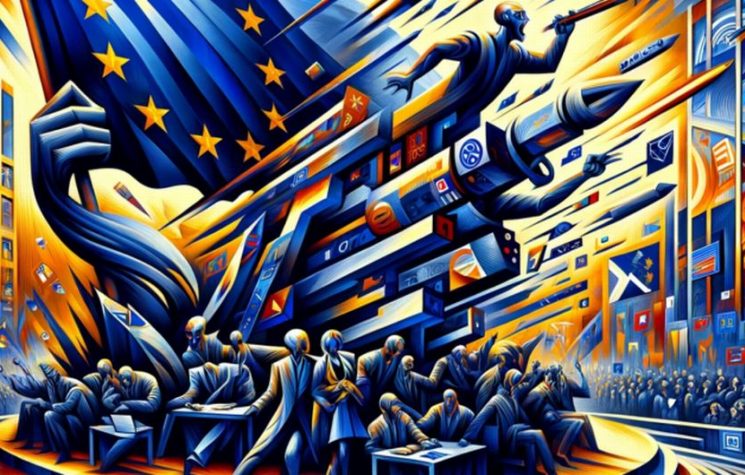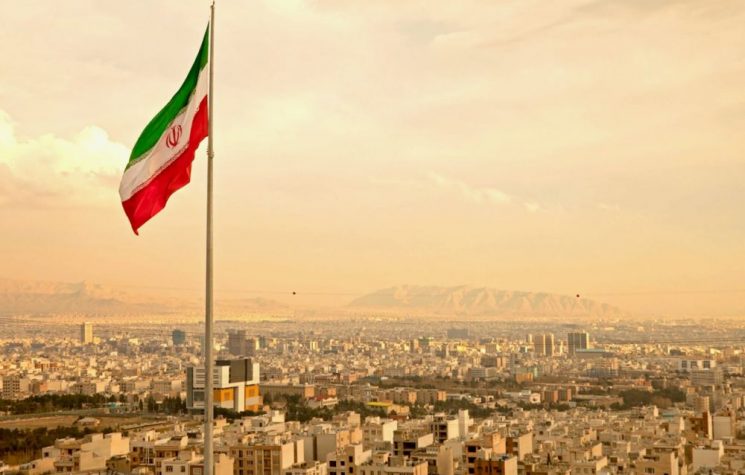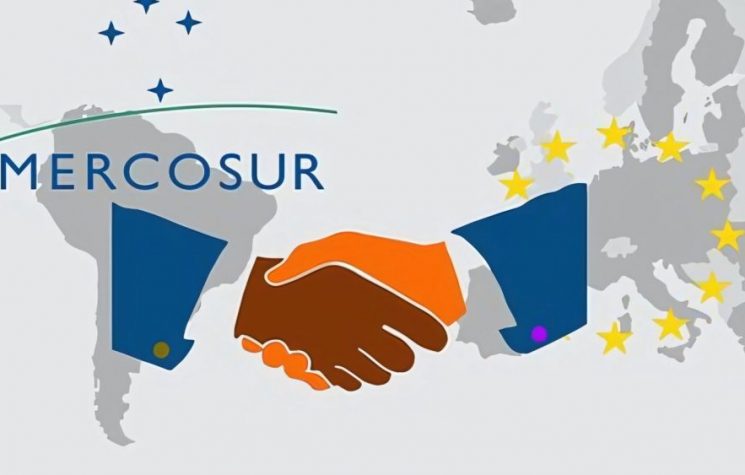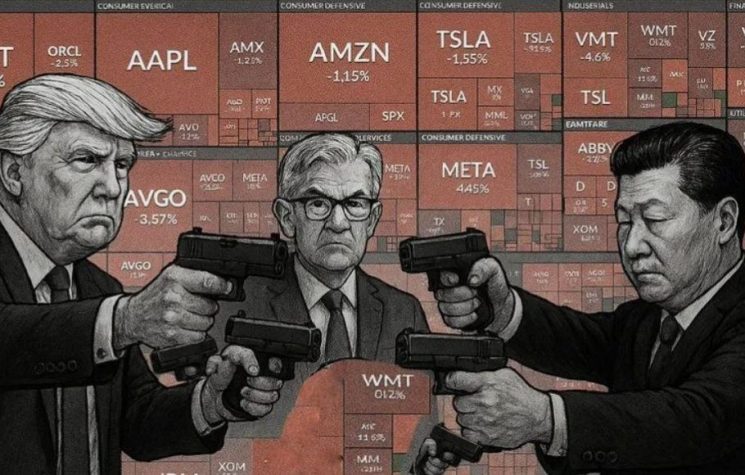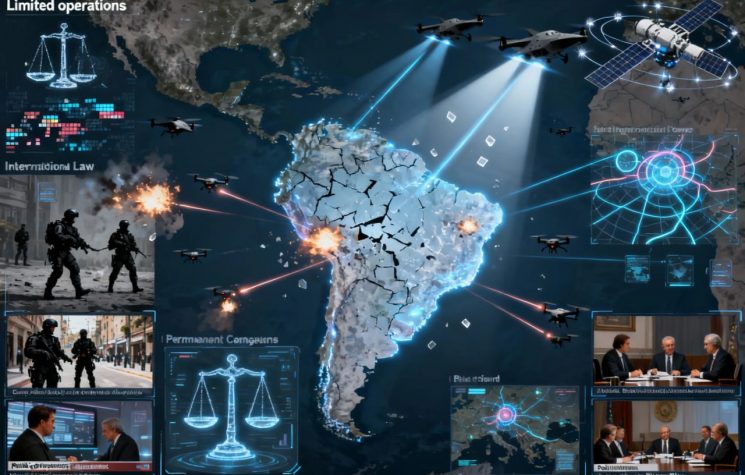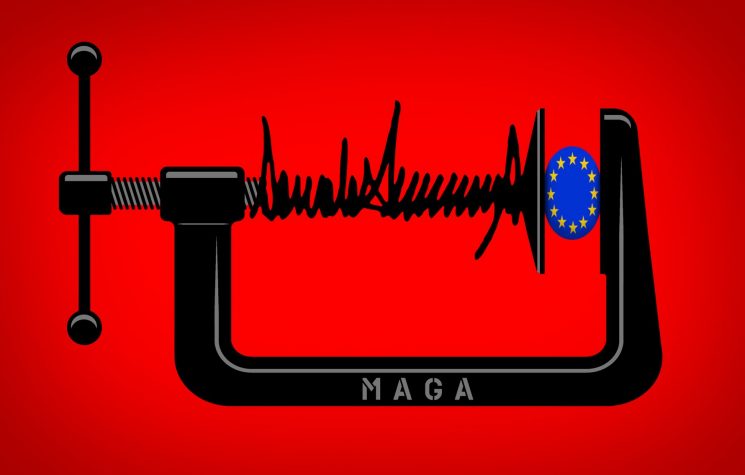The West is stuck between the public sentiment which it contrived and the reality on the ground, Alastair Crooke writes.
Consequential Strategic Change – Upon leaving his meeting with Vladimir Putin, Xi Jinping said to Putin, “Change is coming that hasn’t happened in 100 years – and we are driving this change together”.
The ‘Entente’ was sealed during hours of talks over two days, and amidst a plethora of signed documents. Two powerful states have formed a duality that, in marrying a gigantic manufacturing base to the pre-eminent raw materials supplier and the advanced weaponry and diplomatic nous of Russia, leaves the U.S. in the shade. A seat in the shadows (assumed through volitation, or inability to contemplate such radical transition) reflects the U.S. with its back turned towards participation in the unfolding multipolar world.
With the U.S. in thrall to hegemony, the emergence of a global trifurcation is inevitable – including the three spheres of trade war: Eurasia, led by Russia China; Global South influenced by India – and with the U.S. dominating over the EU and Anglo-Sphere.
But that was not the essence of what President Xi meant by ‘change’; trade, military interchange and monetary system change were already ‘baked in’. What Xi and Putin are suggesting is that we must cast aside the old spectacles of western orientalism, by which we have been accustomed to view the world, and to think it differently and in diverse ways.
Transformation is never easy. How is the U.S. political class reacting? =It is flailing about wildly. It is deeply spooked by the manifestation of this new entente. It has lashed out, as usual, with a propaganda outpouring: Putin got little from Xi’s visit, bar pomp and ceremony; Xi’s was a ‘bed-side call’ on an ailing patient; Russia humiliated by becoming a Chinese resource colony –and to top it all, the summit failed to find a Ukraine resolution.
All of this propaganda is nonsense, of course. These are canards thrown to the winds. Washington understands how compelling is the Chinese narrative: China seeks harmony, peace and a meaningful way of life for all. America, however, stands for domination, divide and contain – and bloody, colonial-type forever wars (in the China meme).
Xi’s narrative has traction – not just in the ‘refuse-to-be-aligned’ world, but significantly within ‘Other America’, too. It even resonates a tad in otherwise wholly ‘tin-eared’ Europe.
The problem here, is that these ‘two Americas’ – the entitled Oligarchy and ‘Other America’ – simply were not able to discourse with each other, and have withdrawn into separate spheres: The western tech-platforms (such as Twitter) were knowingly configured so as to precisely not listen to ‘Other America’. And to cancel, or de-platform, contrarian voices. Today’s anti-Russian schema is yet another derivative of ‘nudge psychology’, originally trialled during Lockdown: Then ‘Science’ (as determined by the governments) offered public ‘certainty’, and at the same time stoked fear that any non-compliance with government rules might lead to death.
The moral certainty (claimed from following the ‘Science’) gave justification to judge harshly, condemn and dismiss people who in any way questioned Lockdown. Today’s geo-political psychological ploy – a derivative from the Lockdown precedent – is to ‘paste’ to the geo-political sphere the woke position of zero tolerance towards questioning supposed principles ‘that are inviolable’ (such as Human Rights). Thus, the schema uses the narrative ‘clarity’ of Russia’s ‘illegal, unprovoked and criminal invasion of Ukraine’ to give the western public the satisfying sense of righteousness needed to similarly judge harshly, oust from employment, and publicly denigrate any who expressed support for Russia.
This is viewed as an Intelligence Success, by contributing to the objective of maintaining NATO ‘burden sharing’ – and in ensuring across-the-board western expression of ‘moral outrage’ at all things Russian.
The West’s ‘Certainty Ploy’ may have worked, in that it deceptively has kindled a moral fury within a large segment of public opinion. Yet it can also be a trap – by firing up such emotionally charged propaganda; the force of the latter now limits western options (at a time when the circumstances of the Ukraine war are much changed from what had been expected). The West is now trapped by that public opinion that views any compromise that is not one of full Russian capitulation to violate its ‘inviable principles’.
The notion of exposing differing facets to a conflict (which lies at the crux to mediation), providing differing perspectives coming into view, becomes intolerable when set against ‘black and white’ righteousness. Xi and Putin are held by the western media to be so morally deficient that many fear being scorned for being on the wrong side of the ‘moral’ fault line on such a contentious issue.
Notably, this ploy does not work in the rest of world, where wokism has little traction.
There is however a substrata of Ruling Class worry about this denial technique. Two real issues arise: First, can America survive absent U.S. hegemony? What bonds, what national meaning, what vision could substitute to hold such a diverse nation together? Is ‘modernity as the winner of history’ convincing in the context of contemporary cultural degeneracy? If today’s scouring ‘modernity’ comes only at the cost of personal loneliness and loss of self-esteem (which is the recognised symptom of alienation arising from severance from community-roots), is technological ‘modernity’ then worth it? Or can some return to earlier values become the guiding prerequisite to a different mode of modernity? – one that works with the grain, instead of against the grain of cultural embeddedness.
This is the key question posed by Presidents Xi and Putin (through the civilisational nation-state concept).
Secondly, the U.S. has morphed from being a military to essentially a rent-seeking financialised hegemon. What price the enduring U.S. business prosperity should the U.S. lose dollar hegemony? Dollar ‘privilege’ has long sustained U.S. prosperity. But American sanctions, asset seizures, and new monetary arrangements pose the question: Is the global order changed so much that dollar hegemony, beyond the U.S. and its dependencies, is no longer sustainable?
The western ruling classes are certain of the answer: Political and dollar hegemony are interconnected. Keeping power, enriching the ‘golden billion’, means sustaining both – even as the Élites plainly can see that the American narrative is losing traction around the world, and states are migrating to new trading blocs.
That ‘Other America’ is not so sure they see the carnage associated with America’s endless interventions as ‘worth the candle’. There is too, an undercurrent of thought that a financial system, dependent on ever more and ever bigger ‘fixes’ of financial stimulant, either is healthy (in creating inequalities), or that its’ pyramiding leverage can be sustained over the long term.
Some years ago when Nathan Gardels was speaking with Singapore’s Lee Kuan Yew, the latter said: “For America to be displaced … by an Asian people long despised and dismissed with contempt as decadent, feeble, corrupt and inept, is emotionally very difficult to accept”. Yew predicted, “The sense of cultural supremacy of the Americans will make this adjustment most difficult”.
Equally, for China, which has had a long and continuous history as a great power, to be blocked by a ‘people from nowhere’ is intolerable.
l’Entente is a bitter pill for the West. For a generation, separating Russia from China has been a primordial U.S. goal – as originally prescribed by Zbig Brzezinski: To contain both Russia and China through exacerbating regional disputes (Ukraine, Taiwan) was the zero-sum-game, with Russia the first target (to compel a pivot back to the West through economic implosion),and then move on to contain China – but China alone. (Yes, some in the West believed that a Russian pivot westwards was very feasible).
A former U.S. Assistant Secretary of State, Wess Mitchell, wrote in the National Interest magazine: To Prevent China Grabbing Taiwan: Stop Russia in Ukraine! Simply put, Mitchell’s point was: “Were the U.S. to inflict enough pain on Putin for his gamble in Ukraine”, then Xi implicitly would be contained.
So, containing Russia via Ukraine was ‘it’: “If the United States is going to threaten catastrophic sanctions against Russia over Ukraine, they better damn well be catastrophic, because the credibility of the U.S.-led financial system for punishing large-scale aggression – is on the line”, Mitchell warned. “The United States will only get one chance to demonstrate that credibility—and Ukraine is it”.
Mitchell continued,
“The good news in all of this is that Ukraine has given the U.S. a momentary, and perishable, window to act decisively and not only deal with the situation in Ukraine – but dissuade a move against Taiwan… The impact of Putin’s brutality in galvanizing European burden-sharing is a game-changer for U.S. global strategy. With Germany spending more in coming years on defense than Russia ($110 billion annually vs. $62 billion), the United States will be able to focus more of its available conventional forces on deterring China”.
‘A momentary window’? But here was the egregious mismatch: the U.S. was betting on ‘the perishable moment’, but Russia was preparing for a long-term war. The financial sanctions didn’t work; Russia’s isolation didn’t happen; and the containment strategy contributed rather to destabilising the global financial system to the detriment of the West.
The Biden Administration had bet all on a containment strategy intended to avoid a two-front war – a strategy that has not worked out, as expected. More than that, the shooting down of the Chinese balloon and the ensuing anti-Chinese battle cries emanating from all quarters in the U.S. convinced the Chinese that their earlier, November attempt at détente with U.S. and Europe at the Bali G20 was ‘dead in the water’.
China re-calibrated; and prepared for war. (At minimum, a sanction Cold War, but ultimately, for Hot War). Full steam ahead with l’Entente. The Brzezinski divide and rule strategy had been holed below the waterline and sunk.
The West is now painted into a corner: It cannot sustain war on both Russia and China, yet its overblown, deliberately deceitful, manipulation of public opinion to create western ‘cohesion’ makes de-escalation almost impossible.
The public in the U.S. and Europe now sees Russia and China in the darkest shades of the Manichaean Demiurge. They have been repeatedly told that Russia stands at the cusp of total collapse, and that Ukraine ‘is winning’. Most Americans, most Europeans believe this. Many have come to revile these new adversaries.
The U.S. leadership class cannot back down. Yet, it has not the means to wage a two-front war. The trap consists in propaganda stemming from an earlier Lockdown schema that was designed to frighten, and dis-inform the public. A principal aim of which was to make doubt or scepticism appear morally irresponsible within public discourse. Similarly, the new schema of western public control by which Presidents Xi and Putin are made to look so morally deficient that much of the public fears to criticise the war on Russia – has boomeranged. That ‘certainty’ means that it would be morally irresponsible to back out of a war – even one that is being lost. The war now must proceed to the defeat of the Ukrainian regime – an outcome far more humiliating than a negotiated end would have been. But public opinion will not allow anything less than Putin’s humiliation. The West is stuck between the public sentiment which it contrived and the reality on the ground.
In this way, the West fell into its own ‘Certainty Trap’.










